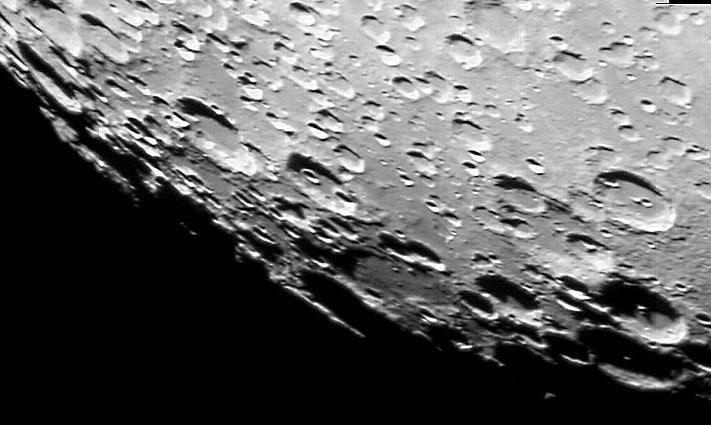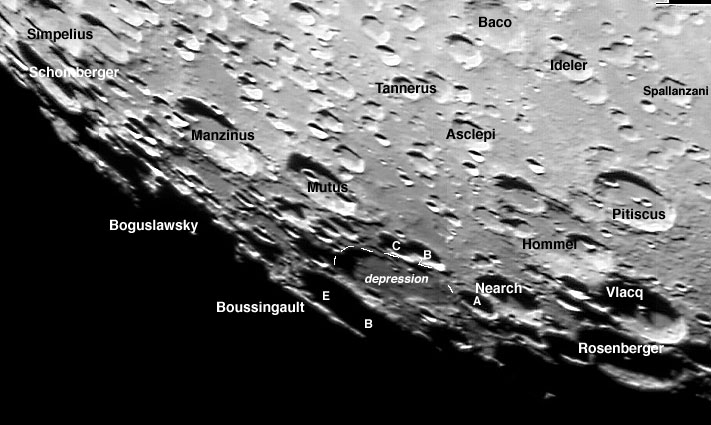Difference between revisions of "July 13, 2004"
| (8 intermediate revisions by the same user not shown) | |||
| Line 1: | Line 1: | ||
__NOTOC__ | __NOTOC__ | ||
=A Strange Depression= | =A Strange Depression= | ||
| + | <!-- Start of content --> | ||
<table width="85%" border="0" align="center" cellpadding="6" cellspacing="2"> | <table width="85%" border="0" align="center" cellpadding="6" cellspacing="2"> | ||
<tr> | <tr> | ||
| Line 8: | Line 9: | ||
<tr> | <tr> | ||
<td colspan="2"><div align="center"> | <td colspan="2"><div align="center"> | ||
| − | + | {{HoverImage|LPOD-2004-07-13.jpeg|LPOD-2004-07-13b.JPEG}} | |
</div></td> | </div></td> | ||
</tr> | </tr> | ||
| Line 14: | Line 15: | ||
<table width="100%" border="0" cellpadding="8"> | <table width="100%" border="0" cellpadding="8"> | ||
<tr> | <tr> | ||
| − | <td><div align="center | + | <td><div align="center"><p>Image Credit: [mailto:bobbotts@cogeco.ca Bob Botts ]</p></div></td> |
</tr> | </tr> | ||
</table> | </table> | ||
| Line 20: | Line 21: | ||
<p class="story" align="center"><b>A Strange Depression</b></p> | <p class="story" align="center"><b>A Strange Depression</b></p> | ||
<p class="story" align="left"> | <p class="story" align="left"> | ||
| − | The southeastern highlands of the Moon are infrequently visited by amateur and professional students of the Moon rarely observe the southeastern highlands of the Moon because the region doesn't seem very interesting. Other than Janssen there aren't any large, dramatic craters. And the sameness of all the flat-floored 20-40 km wide craters (basin secondaries?) make it repetitive and hard to find your way around. So I was pleasantly surprised when looking at Bob Botts' nice mosaic to immediately notice a large feature that had escaped my attention for the last 40 years! The sunset terminator area of the image is interesting because it shows central peaks in Vlacq and Rosenberger just catching their last light for 14 days, and Schomberger presents a very dramatic near profile. But what caught my eye was a shadow-casting curved wall roughly between Nearch and Mutus. The floor of the area inside the wall is definitely depressed and looks smoother than the nearby inter-crater plains. My first thought was, "Ah hah - this is the center of the ancient Vlacq-Mutus impact basin that Don Wilhelms described, but I could never see!" But it's not. Wilhelms maps the basin wall as passing by Vlacq, Nearch and Mutus, with the center of the basin near Baco, The depression this image shows so well is just outside the putative basin rim. Quickly looking at Lunar Orbiter IV images I saw that indeed there is a peculiar depression, but it isn't clear to me what it is is. Virtually all rimmed holes on the Moon are impact craters of some size and stage of degradation. This depression doesn't look like a crater. The Orbiter images show that the floor is a mare-like material (but not low albedo) that has buried some craters (creating ghost rings), and near Nearch B has created a bench, like it crumpled up against a wall. This is a great new mystery feature! | + | The southeastern highlands of the Moon are infrequently visited by amateur and professional students of the Moon rarely observe the southeastern highlands of the Moon because the region doesn't seem very interesting. Other than Janssen there aren't any large, dramatic craters. And the sameness of all the flat-floored 20-40 km wide craters (basin secondaries?) make it repetitive and hard to find your way around. So I was pleasantly surprised when looking at Bob Botts' nice mosaic to immediately notice a large feature that had escaped my attention for the last 40 years! The sunset terminator area of the image is interesting because it shows central peaks in Vlacq and Rosenberger just catching their last light for 14 days, and Schomberger presents a very dramatic near profile. But what caught my eye was a shadow-casting curved wall roughly between Nearch and Mutus. The floor of the area inside the wall is definitely depressed and looks smoother than the nearby inter-crater plains. My first thought was, "Ah hah - this is the center of the ancient Vlacq-Mutus impact basin that Don Wilhelms described, but I could never see!" But it's not. Wilhelms maps the basin wall as passing by Vlacq, Nearch and Mutus, with the center of the basin near Baco, The depression this image shows so well is just outside the putative basin rim. Quickly looking at Lunar Orbiter IV images I saw that indeed there is a peculiar depression, but it isn't clear to me what it is is. Virtually all rimmed holes on the Moon are impact craters of some size and stage of degradation. This depression doesn't look like a crater. The Orbiter images show that the floor is a mare-like material (but not low albedo) that has buried some craters (creating ghost rings), and near Nearch B has created a bench, like it crumpled up against a wall. This is a great new mystery feature! </p> |
<blockquote> | <blockquote> | ||
| − | <p align="right" class="story">— [mailto:tychocrater@yahoo.com Chuck Wood]</ | + | <p align="right" class="story">— [mailto:tychocrater@yahoo.com Chuck Wood]</p></blockquote> |
| − | </ | ||
<p class="story" align="left"><b>Technical Details:</b><br> | <p class="story" align="left"><b>Technical Details:</b><br> | ||
| − | October 14 or 15, 2003. 12" SCT f10 with Toucam webcam, processed using Registax | + | October 14 or 15, 2003. 12" SCT f10 with Toucam webcam, processed using Registax</p> |
<p class="story" align="left"><b>Related Links: </b><br> | <p class="story" align="left"><b>Related Links: </b><br> | ||
| − | [ | + | [http://www.lpi.usra.edu/research/lunar_orbiter/images/aimg/iv_070_h3.jpg Lunar Orbiter IV View] </p> |
| − | <p | + | <p><b>Yesterday's LPOD:</b> [[July 12, 2004|Look Twice, Twice]] </p> |
| + | <p><b>Tomorrow's LPOD:</b> [[July 14, 2004|Jim and Davy]] </p> | ||
</tr> | </tr> | ||
</table> | </table> | ||
| Line 39: | Line 40: | ||
<td><p align="center" class="main_titles"><b>Author & Editor:</b><br> | <td><p align="center" class="main_titles"><b>Author & Editor:</b><br> | ||
[mailto:tychocrater@yahoo.com Charles A. Wood]</p> | [mailto:tychocrater@yahoo.com Charles A. Wood]</p> | ||
| − | < | + | <!-- Cleanup of credits --> |
| − | + | <!-- Cleanup of credits --> | |
| − | < | + | <!-- Cleanup of credits --> |
| − | + | <!-- Cleanup of credits --> | |
| − | < | + | <!-- Cleanup of credits --> |
| − | + | <!-- Cleanup of credits --> | |
| + | <!-- Cleanup of credits --> | ||
</tr> | </tr> | ||
</table> | </table> | ||
| Line 50: | Line 52: | ||
<div align="center"></div> | <div align="center"></div> | ||
<p> </p> | <p> </p> | ||
| − | ---- | + | <!-- End of content --> |
| − | + | {{wiki/ArticleFooter}} | |
| − | |||
Latest revision as of 21:40, 8 February 2015
A Strange Depression
Image Credit: Bob Botts |
|
A Strange Depression The southeastern highlands of the Moon are infrequently visited by amateur and professional students of the Moon rarely observe the southeastern highlands of the Moon because the region doesn't seem very interesting. Other than Janssen there aren't any large, dramatic craters. And the sameness of all the flat-floored 20-40 km wide craters (basin secondaries?) make it repetitive and hard to find your way around. So I was pleasantly surprised when looking at Bob Botts' nice mosaic to immediately notice a large feature that had escaped my attention for the last 40 years! The sunset terminator area of the image is interesting because it shows central peaks in Vlacq and Rosenberger just catching their last light for 14 days, and Schomberger presents a very dramatic near profile. But what caught my eye was a shadow-casting curved wall roughly between Nearch and Mutus. The floor of the area inside the wall is definitely depressed and looks smoother than the nearby inter-crater plains. My first thought was, "Ah hah - this is the center of the ancient Vlacq-Mutus impact basin that Don Wilhelms described, but I could never see!" But it's not. Wilhelms maps the basin wall as passing by Vlacq, Nearch and Mutus, with the center of the basin near Baco, The depression this image shows so well is just outside the putative basin rim. Quickly looking at Lunar Orbiter IV images I saw that indeed there is a peculiar depression, but it isn't clear to me what it is is. Virtually all rimmed holes on the Moon are impact craters of some size and stage of degradation. This depression doesn't look like a crater. The Orbiter images show that the floor is a mare-like material (but not low albedo) that has buried some craters (creating ghost rings), and near Nearch B has created a bench, like it crumpled up against a wall. This is a great new mystery feature! Technical Details: Related Links: Yesterday's LPOD: Look Twice, Twice Tomorrow's LPOD: Jim and Davy |
Author & Editor: |
COMMENTS?
Register, Log in, and join in the comments.





